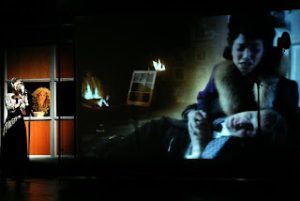Lipsynch
SYDNEY FESTIVAL presents LIPSYNCH, an Ex Machina / Theatre Sans Frontieres production in association with Cultural Industry Ltd and Northern Stage, at the Theatre Royal.
LYPSYNCH was an eight and a half hour performance directed by Robert Lepage. Time passed with surprising ease. It was never difficult to participate in. This work began life a year or so ago. First appearing in Newcastle, England, in February 2007. Subsequently it has appeared elsewhere around the world and has a future set of dates to come. Robert Lepage explains that the process of art for him it is one of that can be likened to that of an evolving living organism. The act of creativity is continuous and even when witnessed in the performance space it is in a place of fluidity. Nothing is ever completely fixed. The possibility of change, even excision, is available to the artists. So what began in Newcastle in 2007 is now an expanded 9 acts of creative input. The work has been prepared by the performers, from all disciplines, I imagine, in a collaborative investigation, taking the phenomenon of the voice/sound as the genesis of the work. What we saw in Sydney may not be what the next port-of-call may see. Certainly, I felt, that not all the work had the same discipline or clarity. Some of it laboured and/or was unfocused for me, as it is in life. Sometimes the purpose of the investigation appeared only tangentially connected and maybe could be edited or cut.
Using the hook of the investigation of sound the first act of nine; Act 1: Ada, encompasses the wonderful delight of the observation of the sublime innocence of the sound of a crying baby to the sublime sophistication of an opera singer and the sophisticated manipulation of the production of that sound. (The beautiful cadences of the sentimental and sublime sample from Gorecki’s Symphony #3.)The contrast is a wonderful contemplation. Later we see varying observations of this theme: the lypsynching of a silent film and the search for the authentic or “truthful” sound; the multiplicity of languages and the use of different sounds to communicate; Voice therapy etc. The investigation to demonstrate “the relationship between voice and identity, status and class”. The presentation style of each of the facets of observed concentrations is that of an everyday naturalism. The writing and the acting style is deliberately “soap opera-ish”, mostly afternoon television style. Banal conversations full of untheatrical information, full of the hesitations and non sequitors of real life, the odd daily juxtaposition of the reporting of world disaster beside the mundanity of talking of a need for a key to the front door, full of silences and spaces. It is a very unhurried and casual story telling mode. It takes it’s time. It is part of the reason for the ease of the endurance A: because it is relatively undemanding of you and B: mesmeric in its absorption of real time and real events. The fascination of the details, the stylistic organisation of Mr Lepage in insisting that we have the time to observe minutely what is in front of us so that the ordinary begins to take on significant meaning. The Hichcockian attention to time in, for instance, Act 8: Michelle, where we view the scene from outside the bookshop window to inside the shop is a gently revelatory and formally resonant experience. It takes its time to unravel.
This acting style is replicated by the production style. Set changes happen as part of the audience’s experience; it takes its time. The first act has us watch the set and multi media contribution shift from an aircraft to a train to a tube journey, underground, to a hotel room. Everything is given the breath space to be included for us to observe and absorb. Unhurried. There were sequences of this epic that I felt could be easily lost and there were episodes that were sublime. Like any living organism it was not perfect. It was sometimes shapeless, wandering and boring. But one persevered because a wonder might also appear and it did.
So the reason for this late “review” is because I was very ambivalent to the experience. I was genuinely underwhelmed. I have only seen one other work by Mr Lepage, THE ANDERSEN PROJECT, and that too was a disappointment to my expectation. My reading and the conversations of friends have held The Lepage work in awe. I was both times, perhaps, in an anticipatory state that was not fair to what I actually experienced. Maybe, if I also knew, particularly, THE SEVEN STREAMS OF THE RIVER OTA; or THE FAR SIDE OF THE MOON I would be in a better place of appreciation. Certainly my “fanatical” friends loved the piece. I felt the story telling style was “in a used by date”, especially after the recent experiences of DV8 and COMPLICITE, and their use of multi-media and complex scene shifting journeys. The writing and acting styles indulgent and sometimes boring.
But still, I am left with wonderful bits and pieces of wonder. The Act 2: Thomas script was enlightening and provocative. It led me to a state of anticipatory excitement for further philosophical discoveries and observations. Is it just the fluent, deliberately unfinished mechanisms of the work, in process mode, that allows the lack of theatrical shape or is it about the randomness of life? Like the recent film BABEL it demonstrates the connectiveness of everything to each other. If LYPSYNCH sits puzzlingly in my memory, has it achieved its objective? I am glad to have seen it but I am hesitant about wanting to see more of this company’s work. On the other hand I am hanging out for Mnouchkine or Complicite to return to stimulate me.
How do you experience this work?

